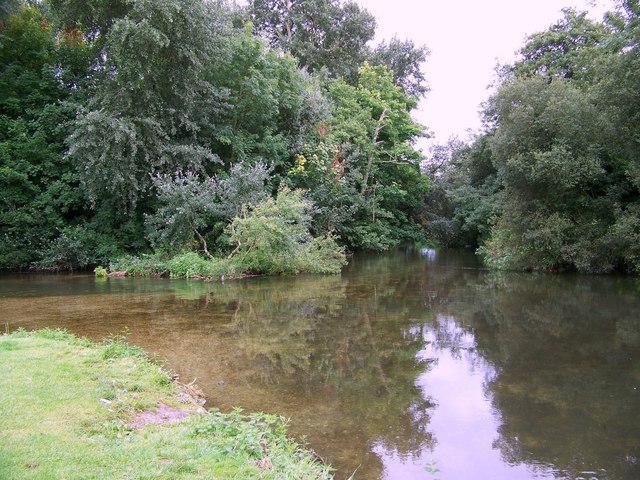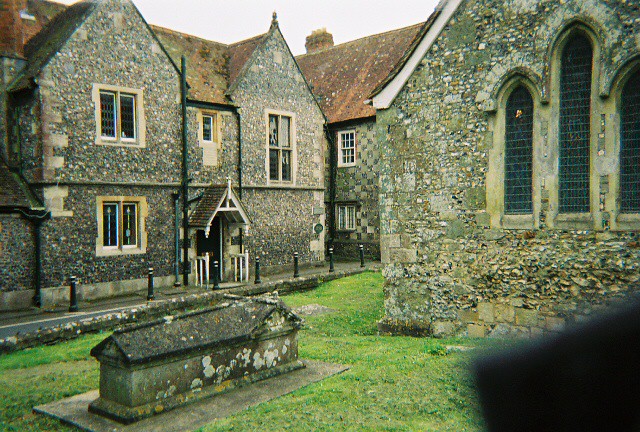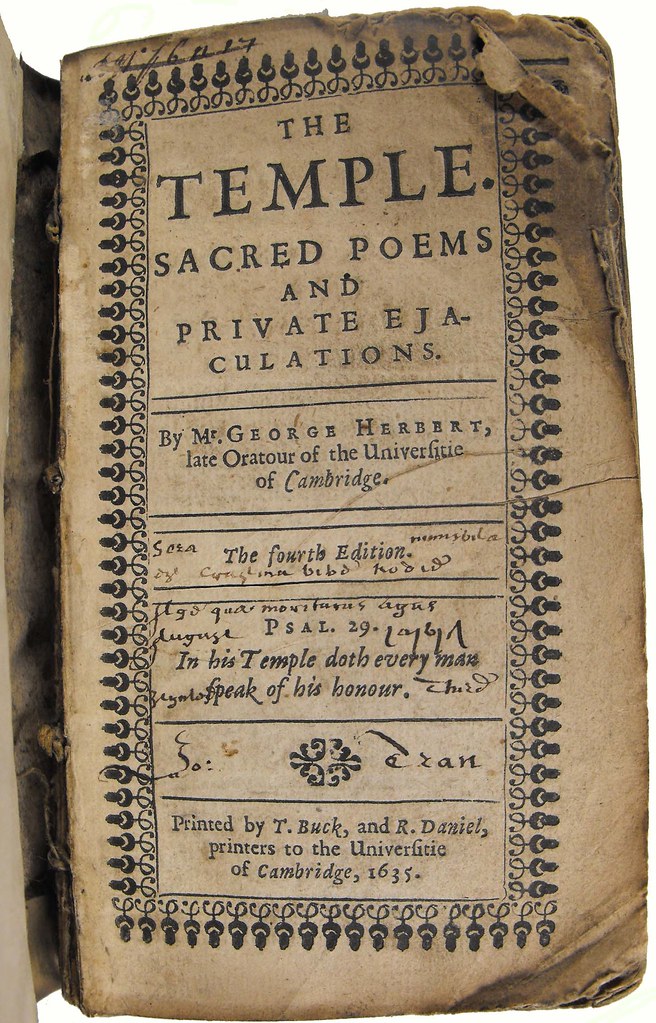.
Love bade me welcome, yet my soul drew back,
Guiltie of dust and sinne.
But quick-ey'd Love, observing me grow slack
From my first entrance in,
Drew nearer to me, sweetly questioning
If I lack'd anything.
A guest, I answer'd, worthy to be here:
Love said, You shall be he.
I, the unkinde, the ungratefull? Ah my deare,
I cannot look on thee.
Love took my hand, and smiling did reply,
Who made the eyes but I?
Truth Lord, but I have marr'd them: let my shame
Go where it doth deserve.
And know you not, sayes Love, who bore the blame?
My deare, then I will serve.
You must sit down, sayes Love, and taste my meat:
So I did sit and eat.
Guiltie of dust and sinne.
But quick-ey'd Love, observing me grow slack
From my first entrance in,
Drew nearer to me, sweetly questioning
If I lack'd anything.
A guest, I answer'd, worthy to be here:
Love said, You shall be he.
I, the unkinde, the ungratefull? Ah my deare,
I cannot look on thee.
Love took my hand, and smiling did reply,
Who made the eyes but I?
Truth Lord, but I have marr'd them: let my shame
Go where it doth deserve.
And know you not, sayes Love, who bore the blame?
My deare, then I will serve.
You must sit down, sayes Love, and taste my meat:
So I did sit and eat.
George Herbert (1593-1633): Love (III), from The Temple (1633)
"...and
he was also the same day—which was April 26th, 1630—inducted into the
good, and more pleasant than healthful, parsonage of Bemerton, which is a
mile from Salisbury.
"I have now brought him to the parsonage of Bemerton, and to the thirty-sixth year of his age, and must stop here, and bespeak the reader to prepare for an almost incredible story, of the great sanctity of the short remainder of his holy life...
"When at his induction he was shut into Bemerton Church, being left there alone to toll the bell,—as the law requires him,—he stayed so much longer than an ordinary time, before he returned to those friends that stayed expecting him at the church door, that his friend Mr. Woodnot looked in at the church window, and saw him lie prostrate on the ground before the altar; at which time and place—as he after told Mr. Woodnot—he set some rules to himself, for the future manage of his life; and then and there made a vow to labour to keep them.
"And the same night that he had his induction, he said to Mr. Woodnot, “I now look back upon my aspiring thoughts, and think myself more happy than if I had attained what then I so ambitiously thirsted for. And I now can behold the court with an impartial eye, and see plainly that it is made up of fraud and titles, and flattery, and many other such empty, imaginary, painted pleasures; pleasures that are so empty as not to satisfy when they are enjoyed. But in God, and his service, is a fulness of all joy and pleasure, and no satiety. And I will now use all my endeavours to bring my relations and dependants to a love and reliance on him, who never fails those that trust him. But above all, I will be sure to live well, because the virtuous life of a clergyman is the most powerful eloquence to persuade all that see it to reverence and love, and at least to desire to live like him. And this I will do, because I know we live in an age that hath more need of good examples than precepts."
"I have now brought him to the parsonage of Bemerton, and to the thirty-sixth year of his age, and must stop here, and bespeak the reader to prepare for an almost incredible story, of the great sanctity of the short remainder of his holy life...
"When at his induction he was shut into Bemerton Church, being left there alone to toll the bell,—as the law requires him,—he stayed so much longer than an ordinary time, before he returned to those friends that stayed expecting him at the church door, that his friend Mr. Woodnot looked in at the church window, and saw him lie prostrate on the ground before the altar; at which time and place—as he after told Mr. Woodnot—he set some rules to himself, for the future manage of his life; and then and there made a vow to labour to keep them.
"And the same night that he had his induction, he said to Mr. Woodnot, “I now look back upon my aspiring thoughts, and think myself more happy than if I had attained what then I so ambitiously thirsted for. And I now can behold the court with an impartial eye, and see plainly that it is made up of fraud and titles, and flattery, and many other such empty, imaginary, painted pleasures; pleasures that are so empty as not to satisfy when they are enjoyed. But in God, and his service, is a fulness of all joy and pleasure, and no satiety. And I will now use all my endeavours to bring my relations and dependants to a love and reliance on him, who never fails those that trust him. But above all, I will be sure to live well, because the virtuous life of a clergyman is the most powerful eloquence to persuade all that see it to reverence and love, and at least to desire to live like him. And this I will do, because I know we live in an age that hath more need of good examples than precepts."
Izaak Walton (1593-1683), from The Life of Mr. George Herbert, 1670
“Often, at the culminating point of a violent
headache, I make
myself say it [George Herbert's poem Love (III)] over, concentrating all my attention upon it and clinging
with all my soul to the tenderness it enshrines..."
Simone Weil (1909-1943): from Spiritual Autobiography, in Waiting for God (1951)
Simone Weil (1909-1943): from Spiritual Autobiography, in Waiting for God (1951)

River Nadder at Bemerton, Wiltshire. The Nadder is the most substantial of the Avon tributaries, rising at Donhead St. Mary and flowing through some of the prettiest countryside in Wiltshire twisting and turning through peaceful water meadows: photo by Trish Steel, 3 August 2008

River Nadder at Bemerton, Wiltshire. During the course of its 20+ mile journey the Nadder meanders and widens gradually until the river joins the River Wylye: photo by Trish Steel, 3 August 2008

Fenced yew on Clearbury Down, near Salisbury, Wiltshire: photo by Jim Champion, 30 May 2006

St Andrews, Bemerton, Wiltshire, the tiny church where George Herbert preached for three years before his death; his remains are buried in the church, before the altar: photo by jazz peach (Sibongile), 30 September 2002

Title page of George Herbert: The Temple, fourth edition (University of Cambridge, T. Buck and R. Daniel, 1635): photo by University of Glasgow Library, 2 November 2010 (University of Glasgow Library, Special Collections)




11 comments:
In his time at Bemerton, Herbert was accustomed to make the walk through the water-meadows into Salisbury, to the cathedral, at least twice weekly, for the sake of the music, which he so loved.
He and Simone Weil suffered through much of their adult lives from a common affliction, tuberculosis. She had learned of his poetry from a young English Catholic whom she met at Solesmes in 1938. This poem in particular became a kind of prayer for her, after she had experienced a mystical revelation while reciting it.
And know you not, sayes Love, who bore the blame?
My deare, then I will serve.
You must sit down, sayes Love, and taste my meat.
I love turn of the conversation. The host that can't be refused. Learning how to be a guest.
Whenever I think the faith I grew up with has entirely evaporated, this poem seems to present itself.
Ah. And what hath time wrought, when it comes to pass "in our day" that irony sets the table.
It's the wonderful tenderness Weil seems to have caught in this. And as you suggest, that lovely sense of a dialogue. And the many meanings of "a life of service".
I like the idea that Love, or Jesus, or call it/him what you will, would be the ultimate servant of the people. When they are in need, when they are hurting, when they are hungry. A kind of general-emergency take-out delivery guy.
Call him up and tell him what you want.
I had forgotten Herbert’s marvelous poem. Thanks for providing his lovely fare again
It gets more fortifying with the passage of time.
A bit more from Walton's Life, on Herbert's taking up the extremely modest parsonage:
"It was not many days before he returned back to Bemerton, to view the church and repair the chancel: and indeed to rebuild almost three parts of his house, which was fallen down, or decayed by reason of his predecessor’s living at a better parsonage-house; namely, at Minal, sixteen or twenty miles from this place. At which time of Mr. Herbert’s coming alone to Bemerton, there came to him a poor old woman, with an intent to acquaint him with her necessitous condition, as also with some troubles of her mind: but after she had spoke some few words to him, she was surprised with a fear, and that begot a shortness of breath, so that her spirits and speech failed her; which he perceiving, did so compassionate her, and was so humble, that he took her by the hand, and said, 'Speak, good mother; be not afraid to speak to me; for I am a man that will hear you with patience; and will relieve your necessities too, if I be able: and this I will do willingly; and therefore, mother, be not afraid to acquaint me with what you desire.' After which comfortable speech, he again took her by the hand, made her sit down by him, and understanding she was of his parish, he told her 'He would be acquainted with her, and take her into his care.' And having with patience heard and understood her wants,—and it is some relief for a poor body to be but heard with patience,—he, like a Christian clergyman, comforted her by his meek behaviour and counsel; but because that cost him nothing, he relieved her with money too, and so sent her home with a cheerful heart, praising God, and praying for him. Thus worthy, and—like David’s blessed man—thus lowly, was Mr. George Herbert in his own eyes, and thus lovely in the eyes of others."
I love this, and may have to take up Simone Weil's method of headache-management.
So do I, and I expect Simone's method would probably work better than Ecotrin.
You must sit down, says Love, and taste my meat.
So I did sit and eat.
Accepting the fact that Love invited you at His/Her table (not always easy to accept) can cure headache. This is the best news so far this morning. Maybe ever?
It is indeed a lot to accept.
But how nice if it were to work, of course.
This might be another way of coming to the table...
Post a Comment